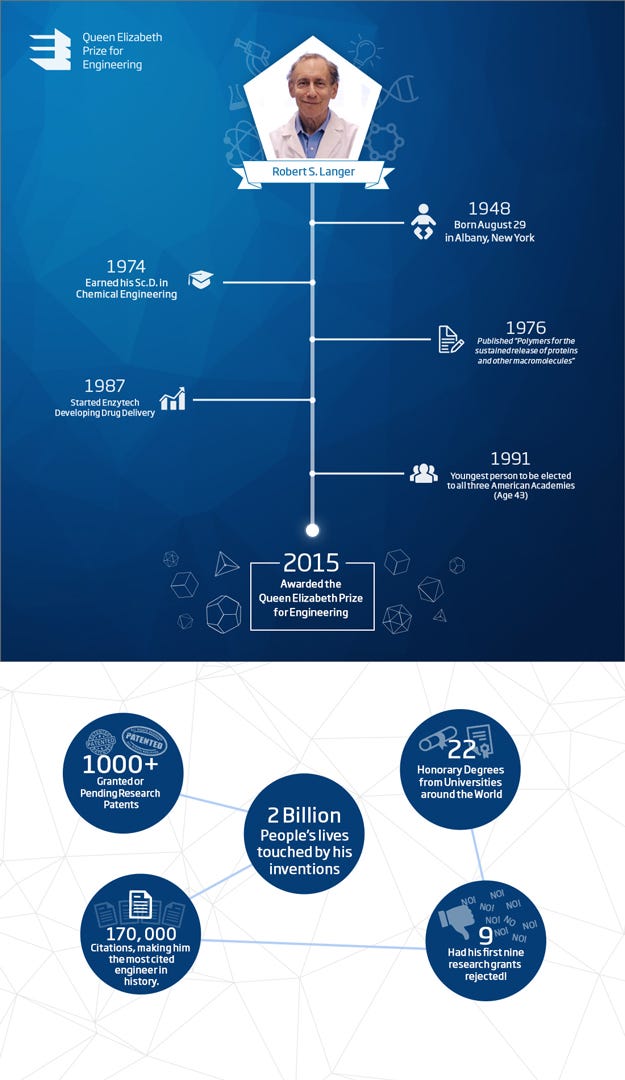A pioneer in the engineering of polymers for drug-delivery applications to treat diseases such as cancer and mental illness, Dr. Robert Langer has been awarded the 2015 Queen Elizabeth Prize for Engineering. The QEPrize, often called the "Nobel" of engineering, is a £1 million ($1.5 million) prize designed to promote engineering globally. Langer is the second recipient of the award, which was first given in 2013 to a group of five people who contributed to the development of the Internet.
February 4, 2015

A pioneer in the engineering of polymers for drug-delivery applications to treat diseases such as cancer and mental illness, Dr. Robert Langer has been awarded the 2015 Queen Elizabeth Prize for Engineering. The QEPrize, often called the "Nobel" of engineering, is a £1 million ($1.5 million) prize designed to promote engineering globally. Langer is the second recipient of the award, which was first given in 2013 to a group of five people who contributed to the development of the Internet.
Langer is one of 11 Institute Professors at the Massachusetts Institute of Technology, MIT's highest honor. His laboratory is the world's largest academic biomedical engineering laboratory.
 A chemical engineer by training, Langer developed his first drug-delivery system in the 1970s, while working with Dr Judah Folkman, a Harvard professor and surgeon at Boston Children's Hospital. Folkman hypothesized that the growth of cancerous tumors could be restricted by stopping angiogenesis, the formation of new blood vessels, and he asked Langer to find a way to inhibit it.
A chemical engineer by training, Langer developed his first drug-delivery system in the 1970s, while working with Dr Judah Folkman, a Harvard professor and surgeon at Boston Children's Hospital. Folkman hypothesized that the growth of cancerous tumors could be restricted by stopping angiogenesis, the formation of new blood vessels, and he asked Langer to find a way to inhibit it.
Langer discovered a way to create polymer micro and nano particles that could release protein-based drugs in the body and used this technique to test possible drugs to control angiogenesis. He and Folkman isolated the first substances that blocked angiogenesis. The drug-delivery system based on biodegradable polymers that Langer invented is the basis for many of today's treatments for cancer and other diseases from schizophrenia to diabetes, reports the Financial Times.
Langer has also been an innovator in tissue engineering by pioneering synthetic polymers that deliver cells to form specific tissue structures. The discovery led to the development of artificial skin approved by FDA for use on burn victims and patients with diabetic skin ulcers.
Langer's most recent project is a microchip-based implant that stores and releases precise doses of drugs on demand or at scheduled intervals for up to 16 years. The technology has completed clinical demonstration and ultimately will be commercialized by Microchips, a company he co-founded. Initial applications may include diabetes, female contraception and osteoporosis, all of which require regular, long-term dosage.
It is estimated that as many as two billion people have, in some way, been touched by technologies devised and developed by Langer and his teams.
Langer has more than 1000 issued and pending patents, is the most cited engineer in history and has earned in excess of 200 major prizes. The many accolades have not dimmed his appreciation of the QEPrize and what it represents: "It is a great honor to win what is, by far, the biggest engineering award in the world," he told the Financial Times.
Queen Elizabeth II will present Langer with the prize at Buckingham Palace later this year.

About the Author(s)
You May Also Like




